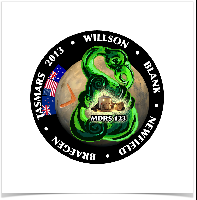- Created by Haritina Mogosanu on Feb 10, 2013
Journalist Report: 02/08/2013
Melanie Newfield
Into the unknown
In 1898 Carsten Borchgrevink set out on the first expedition to overwinter on the Antarctic mainland. He carried supplies to carry him through the long, dark Antarctic winter, food, clothing, fuel, building supplies and guns for shooting polar bears. Such was our understanding of Antarctic life when we first began exploring the frozen unknown.
In some ways, we will arrive on Mars knowing much more than the first explorers knew about Antarctica. We have been observing it with fascination since long before the invention of the telescope. Once the telescope was invented, we began observing its surface, and by the time we headed into the unmapped Antarctic interior our maps of Mars were remarkably good – even if many were convinced it was populated by canal-building green men. We have been sending spacecraft to Mars for nearly 40 years, we have landed rovers on its surface, have photographed its stunning landscapes and have analysed its rocks and its regolith. We have studied its atmosphere and radiation levels, and have a pretty good idea of what we would need to survive there.
Still, every tourist who has read through their Lonely Planet guide probably feels the same way. I know that whenever I’ve travelled, no matter how much I’ve tried to find out in advance, nothing ever prepared me fully for actually being there. Books and photographs, or spectrometer readouts and … analyses, are no substitute for actually going. So it will be for Mars and so it was for my trip to MDRS.
I admit, I felt like I must have been one of the more ignorant arrivals at MDRS. I’m not here because of my knowledge of space in general or Mars in particular. It’s almost embarrassing to admit that I previously didn’t have a great interest in space exploration. The skills that qualified me for this mission come from other spheres – risk analysis, biology, gardening and of course creating recipes from strange ingredients. But there’s something rather marvellous about being completely ignorant on a topic – there are so many exciting things to learn!
I’ve undoubtedly had a crash course on Mars. Emma and I chatted online with students in four different New Zealand schools and had to answer their remarkably astute questions. For the first session, we had a NASA geologist and a NASA engineer standing by to answer the tricky ones – and tricky some of them were. For the rest, we had to get by on our own knowledge – and despite thinking I knew nothing, I discovered that I’d managed to absorb a few facts after all.
In particular, I’ve answered a question that was in my mind since I first discovered (about two months ago), that the geographical features such as mountains on Mars were so many times larger than on Earth. On Earth, tectonic movement, water and wind constantly shape and reshape the landscape. On Mars, the interior has largely cooled so tectonic movement has largely ceased, there is no liquid water on the surface and in the thin atmosphere even the fiercest wind doesn’t have the force that it has on earth. Just thought I’d mention that in case it was bugging you too.
I’ve also learned more than I ever expected about dehydrated food. While I’ll be back to living on fresh, homegrown vegetables at the first opportunity, I have come to appreciate the virtues of powdered tomato and egg, as well as freeze-dried cheese.
One curious fact I’ve learned is that there is will be a place on Mars for some of our most ancient skills, even if they are a little updated.Gardeners and cooks – especially those who can make things like bread from scratch – will provide a welcome boost in morale to those living on space food.
The ongoing challenges that we have had with our toilet have given us all a lesson in patience. We have learned more about eachother’s bowel habits than we could possibly want to know, and yet have managed to laugh about it. I think it’s one of our most remarkable achievements as a crew that we have pulled together in this way – not only had we never worked as a team, but two of the four had never met any of the other crew members. It’s been a remarkably good humoured group, and impressively hardworking. Between us we have done inventories, repaired equipment and tidied in the back of neglected cupboards, as well as working on our projects.
I also realise that while I’ve been learning, I’ve also managed to share some of my knowledge and enthusiasm. At the first opportunity, out among the barren rocks, I was on my hands and knees looking for lichens. After a few days, our crew engineer started spotting them too. We will all be leaving with new knowledge and experience.
ENDS.

- No labels